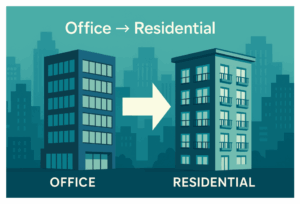Introduction
Zoning is the strategic division of a city into distinct areas, each designated for specific land uses. This system helps ensure harmonious development and proper utilization of land resources. In New York City (NYC), the Department of City Planning (DCP) oversees zoning regulations. One significant zoning change property owners might consider is shifting from office to residential use. This article explores the benefits, processes, and potential pitfalls of such a zoning change, providing a comprehensive guide for property owners contemplating this transition.
The Importance of Zoning in NYC
Zoning is vital in shaping the urban landscape of NYC. It dictates where different types of buildings and activities can occur, helping to organize the city’s growth and development. Proper zoning ensures that commercial, residential, and industrial activities coexist without conflict, promoting a balanced and functional urban environment.
Types of Zoning Changes
Zoning Amendments
These are specific changes to the zoning code applicable to particular areas. They are usually proposed to accommodate new types of development or land use that are not currently allowed under the existing zoning regulations.
Special Permits
Special permits allow properties to be used in ways not typically permitted by the zoning code. They are often granted for projects that offer significant public benefits, such as affordable housing or community facilities.
Rezoning
Rezoning involves comprehensive changes to the zoning code that affect large areas. This process is typically more extensive and may be initiated by the city or property owners seeking to transform the land use in a significant way.
Considering a Zoning Change from Office to Residential
The Demand for Residential Housing
NYC, particularly Manhattan, is experiencing a rising demand for residential housing. This trend is driven by population growth and a desire for urban living spaces. Converting an office building to residential use can tap into this demand, potentially increasing the property’s value significantly.
The Cost of the Zoning Change
The financial implications of a zoning change vary based on the property’s size and the complexity of the change. Costs can include application fees, legal expenses, and potential renovation costs to meet residential standards. However, the potential increase in property value often justifies these expenses.
The Approval Process
The approval process for a zoning change can be intricate and time-consuming. It involves multiple steps, including submitting an application, undergoing public hearings, and receiving approval from the DCP and other relevant bodies. Despite the complexity, the DCP generally supports changes that contribute to affordable housing.
Steps to Achieve Zoning Change
Initial Assessment
Engage a real estate lawyer or zoning consultant to assess the feasibility of the zoning change. They will evaluate the current zoning, property potential, and alignment with city plans.
Prepare Documentation
Compile necessary documents, including detailed plans, impact assessments, and justification for the zoning change. This package should address potential concerns and highlight benefits.
Submit Application
Submit the zoning change application to the DCP. Ensure it meets all requirements and is complete to avoid delays.
Public Hearing and Review
The application will undergo a public review process, including hearings where stakeholders can express support or concerns. Addressing public feedback effectively is crucial.
Final Approval
After thorough review and potential modifications, the application may be approved. Successful approval will change the zoning designation, allowing for residential development.
Property Opportunity
We are offering a unique opportunity to purchase a 24-floor office building in Manhattan currently zoned for commercial use. This building, situated in the heart of Manhattan, is close to major transportation hubs and amenities. The area is rapidly gentrifying, with increasing demand for residential housing. This makes it an ideal candidate for rezoning to residential use, potentially unlocking significant value.
Conclusion
Zoning changes, particularly from office to residential, can substantially increase property value in NYC. With the city’s growing demand for housing, such a transformation is a prudent investment. Property owners should consult with real estate lawyers or zoning consultants to navigate the complexities of the approval process and ensure a successful outcome.
Call to Action
Interested in learning more about zoning changes in NYC or the property opportunity mentioned above? Visit our website or contact us today. Our team is ready to answer your questions and help you make informed decisions about your property.
Frequently Asked Questions
What is the process for changing zoning from office to residential in NYC?
The process involves submitting an application to the Department of City Planning, undergoing public hearings, and receiving approval from various city bodies. Consulting with a real estate lawyer or zoning consultant is advisable.
How long does it take to get a zoning change approved?
The duration varies depending on the complexity of the change and the responsiveness of the involved parties. It can take several months to a few years.
Is it expensive to change the zoning of a property?
Costs vary based on property size and complexity of the change. Expenses can include application fees, legal costs, and renovation costs. However, the potential increase in property value often offsets these costs.
What are the benefits of changing zoning from office to residential?
Benefits include tapping into the high demand for residential housing, potentially increasing property value, and contributing to the city’s housing needs.
Can any property be rezoned from office to residential?
Not all properties are suitable for rezoning. Factors such as location, existing zoning regulations, and city planning objectives play a significant role in determining suitability.
Where can I get help with zoning changes in NYC?
Real estate lawyers and zoning consultants specialize in navigating the zoning change process. They can provide valuable assistance and ensure that all requirements are met.




